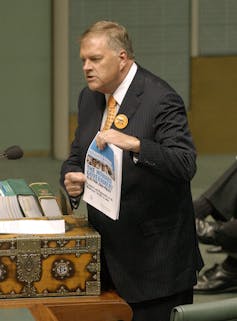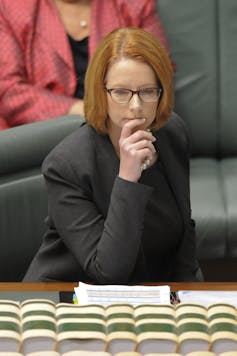If Beazley had become prime minister instead of Rudd, might we have had more stable government?
- Written by Paul Strangio, Associate Professor of Politics, Monash University
A decade ago this month, Australian voters unceremoniously ended John Howard’s prime ministership and swept Kevin Rudd into office.
From today’s vantage point, the November 2007 federal election appears like a hinge between two political eras: one stable and marked by executive mastery; the other chaotic and characterised by confounded leadership.
In reality, some of the dynamics of recent troubles – a fastening news cycle and governments in permanent campaign mode, and a domineering Prime Minister’s Office staffed by personal loyalists – were emerging in Howard’s time.
Moreover, it’s easy to forget now that the Coalition governments of 1996-2007 suffered more than their share of political storms and that Howard, frequently lagging in the opinion polls, conjured his longevity from Houdini-like escapes at election time.
Even so, it’s difficult not to view November 2007 as a dividing line in the nation’s politics. But what if the real hinge date was December 2006, when Labor removed Kim Beazley as its leader and replaced him with Rudd? That partyroom vote ended Beazley’s second period as opposition leader.
The first began after the Keating government’s defeat in March 1996. At the next federal election of October 1998, Beazley fell just short of claiming the prime ministership, despite Labor winning the two-party-preferred vote. He stepped aside following the November 2001 election, after Labor lost ground in a contest shadowed by the September 11 attacks and Howard’s exploitation of the Tampa incident to politically weaponise the issue of border control.
Beazley was resurrected as Labor leader in January 2005, after the party had first discarded Simon Crean and then conducted an ill-fated experiment with Mark Latham.
 Kim Beazley’s low-key leadership style would probably have translated into a more ordered, collegial and measured government.
AAP/Mark Graham
Kim Beazley’s low-key leadership style would probably have translated into a more ordered, collegial and measured government.
AAP/Mark Graham
Beazley’s fall in December 2006 was the product of a political marriage of convenience between Rudd and Julia Gillard. In the light of the civil war that duo fought between 2010 and 2013, it is ironic that in the first flushes of their partnership they were dubbed the “dream team”.
In the recently published first volume of his autobiography, Rudd is adamant that rolling Beazley was a necessary precondition to Labor’s 2007 election victory. He refers to “consistently negative personal support levels over more than a year and a half of public opinion polling” as evidence that voters “had made their mind up” about Beazley. Where have we heard that phrase before?
In her 2014 memoir, however, Gillard admitted to retrospective misgivings about deposing Beazley:
Was I wrong in my judgement of Kim Beazley in 2006? I fear I may have been, that what I inferred as his lack of interest in the work of opposition was really a more nuanced understanding of electoral politics than I then possessed … Kim may rightly have judged that we were so likely to win that a quieter biding of time in the lead-up to election day was a better approach than strenuous political exertion.
Gillard adds:
In politics you never get to run the control test. We will never know what would have happened in a John Howard versus Kim Beazley election or what a Beazley government might have been like.
For a moment, let’s entertain a counter-factual scenario. Could Labor have won in 2007 with Beazley at the helm? Beazley had been a well-liked leader at his two previous election contests: the Australian Election Studies for 1998 and 2001 found he outrated Howard on popularity.
And, while it is true that his personal approval ratings had sagged in his second coming as leader, in the six months prior to his overthrow, Labor headed the Coalition on two-party-preferred terms in nine out of 13 Newspolls.
 Julia Gillard in Question Time in 2013.
AAP/Lukas Coch
Julia Gillard in Question Time in 2013.
AAP/Lukas Coch
Unquestionably, Rudd’s ascension to the leadership was a shot in the arm for Labor’s poll figures. The party then surged well in front of the Coalition. Yet analyses of the 2007 election result have suggested that, despite the hoopla of Labor’s leader-focused “Kevin 07” campaign, the most decisive reasons for the Coalition’s defeat was voter hostility to its WorkChoices industrial relations regime and fatigue with a more-than-decade-old government and its prime minister.
If Beazley rather than Rudd had become prime minister in 2007, there seems little doubt that it would have been a different Labor government. The knocks on Beazley as leader, which were marshalled against him in the December 2006 ballot, were that he lacked urgency, was complacent, too congenial (he “lacked ticker” in a phrase Howard had earlier deployed against him).
Yet, by contrast to the manic, controlling and grandiose tendencies that Rudd brought to office, Beazley’s low-key leadership style would in all probability have translated into a more ordered, collegial and measured government.
Indeed, as a protégé of Bob Hawke and senior minister in his governments, Beazley had a model for how to be a successful Labor prime minister. His governing experience – he was also deputy prime minister under Paul Keating – was something that both Rudd and Gillard lacked. He certainly better understood and was more of a creature of the Labor Party than Rudd, which was another of the latter’s fatal flaws.
It is also relevant to note that the deposition of Beazley in 2006 was symptomatic of a culture of leadership disposability to which a skittish Labor succumbed when in opposition to Howard. The party changed leaders four times between 2001 and 2006. This was a culture that Labor took with it into government, desensitising it to the folly of ambushing Rudd in 2010 and then toppling Gillard in 2013.
Had Labor stilled its hand in December 2006 and Beazley become prime minister in 2007, might Australia have avoided the cycle of destructive leadership instability and political dysfunction that has disfigured the past decade?
As Gillard observes, we can, of course, never know what would have happened: isolating out the effects of individual agency from the complex flow of historical events is notoriously problematic. It remains, though, an intriguing notion.
Authors: Paul Strangio, Associate Professor of Politics, Monash University





